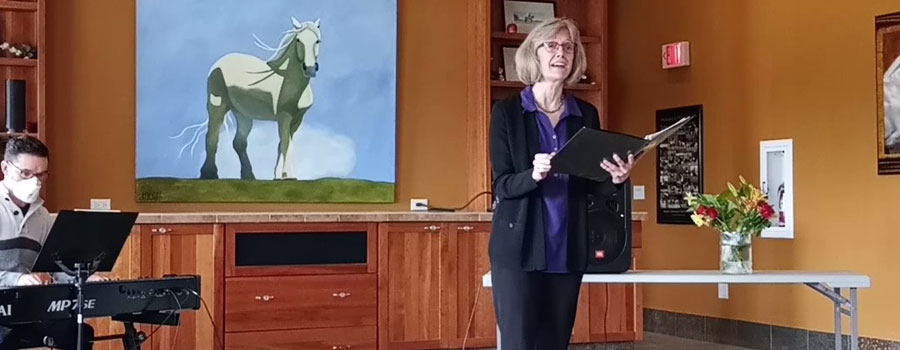This past weekend, I joined 11 other singers in my first recital in more years than I have fingers and toes to count. It was a joyful occasion for my voice coach given that this form of exhibition had been suspended for two years due to the pandemic. She enjoys showcasing her students’ talents while creating a venue toward which we might set performance goals.
I have always wanted to perform Sous le dôme épais (a.k.a. the Flower Duet) from the opera Lakmé by Léo Delibes. It has been sitting on my bucket list for years awaiting a willing operatic soprano with whom to partner. When my teacher agreed to serve that role, I set about the business of (finally) learning the mezzo-soprano part. Suffice it to say, it was a big stretch for my aging vocal cords. Beyond learning the French lyrics, I had to work a relatively dormant vocal range to hit all the notes… and I mean work! I chose a second piece – The Monk and His Cat by Samuel Barber – in a more comfortable range but with the challenge of adapting to a peculiar piano accompaniment and somewhat odd timing.
How did things go? I didn’t quite get there on the Flower Duet. I was good as gold for most of the material but couldn’t navigate the highest notes when tightening up in performance. It was disappointing, to say the least, though I give myself points for having taken on the stretch. And while my execution on the other piece wasn’t flawless, I was pleased with the overall performance.
So, what does this experience have to do with the blog’s overall theme of healthy lifestyles?
FIRST: As discussed in the post Cultivating a Healthy Brain at Any Age, our brains need stimulus and challenge to maintain build their “muscle mass.” When we acquire new skills and knowledge, our brains respond by strengthening and diversifying our synaptic connections. The more agile the neural network, the less likely we’ll face cognitive impairment as we age. I may not have enjoyed all of the prep work leading to the recital – or even the results that I was able to achieve – but I know that my efforts paid dividends for brain health.
SECOND: Goal-setting made my practice sessions more intentional. I didn’t just log the hours when getting ready for each lesson. I knew I’d been standing up in front of others to render these pieces, so I worked harder on the rough spots and extended my practice sessions when I didn’t quite have them. Having fallen short in a couple of areas, I know which adjustments I’ll need to make to improve on the next go round.
THIRD: I have good intel for setting new goals. I’ve no doubt that another surge in effort could address some foibles that showed up last weekend. But I also know that the extra work may not be the best use of my time. I need to step back and ask myself: Is improvement in that area really important to me? Would I gain a tangible health benefit in its pursuit? Or, is there another road to travel that would prove more useful, inspiring, or interesting?
